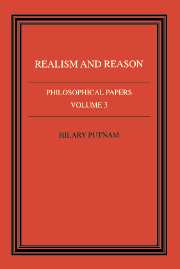Book contents
- Frontmatter
- Contents
- Dedication
- Introduction
- 1 Models and reality
- 2 Equivalence
- 3 Possibility and necessity
- 4 Reference and truth
- 5 ‘Two dogmas’ revisited
- 6 There is at least one a priori truth
- 7 Analyticity and apriority: beyond Wittgenstein and Quine
- 8 Computational psychology and interpretation theory
- 9 Reflections on Goodman's Ways of Worldmaking
- 10 Convention: a theme in philosophy
- 11 Philosophers and human understanding
- 12 Why there isn't a ready-made world
- 13 Why reason can't be naturalized
- 14 Quantum mechanics and the observer
- 15 Vagueness and alternative logic
- 16 Beyond historicism
- Bibliography
- Acknowledgements
- Index
Introduction
Published online by Cambridge University Press: 06 January 2010
- Frontmatter
- Contents
- Dedication
- Introduction
- 1 Models and reality
- 2 Equivalence
- 3 Possibility and necessity
- 4 Reference and truth
- 5 ‘Two dogmas’ revisited
- 6 There is at least one a priori truth
- 7 Analyticity and apriority: beyond Wittgenstein and Quine
- 8 Computational psychology and interpretation theory
- 9 Reflections on Goodman's Ways of Worldmaking
- 10 Convention: a theme in philosophy
- 11 Philosophers and human understanding
- 12 Why there isn't a ready-made world
- 13 Why reason can't be naturalized
- 14 Quantum mechanics and the observer
- 15 Vagueness and alternative logic
- 16 Beyond historicism
- Bibliography
- Acknowledgements
- Index
Summary
The essays collected in this volume were written in a period of rethinking and reconsidering much of my philosophical position. A look at the introduction to the second volume of my Philosophical Papers, and at the essay titled ‘Language and reality’ in that volume, will reveal that in 1975 I thought that the errors and mistakes I detected in analytical philosophy were occasioned by ‘naive verificationism’ and ‘sophisticated verificationism’. I described myself as a ‘realist’ (without any qualifying adjective), and I chiefly emphasized the importance of reference in determining meaning in opposition to the idea, traditional among both realists and idealists, that it is meaning that determines reference. Reference itself I described as a matter of causal connections. The following quotation (from ‘Language and reality’) illustrates these themes at work:
As language develops, the causal and noncausal links between bits of language and aspects of the world become more complex and more various. To look for any one uniform link between word or thought and object of word or thought is to look for the occult; but to see our evolving and expanding notion of reference as just a proliferating family is to miss the essence of the relation between language and reality. The essence of the relation is that language and thought do asymptotically correspond to reality, to some extent at least. A theory of reference is a theory of the correspondence in question.
(p. 290)Information
- Type
- Chapter
- Information
- Philosophical Papers , pp. vii - xviiiPublisher: Cambridge University PressPrint publication year: 1983
Accessibility standard: Unknown
Why this information is here
This section outlines the accessibility features of this content - including support for screen readers, full keyboard navigation and high-contrast display options. This may not be relevant for you.Accessibility Information
- 1
- Cited by
